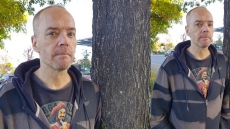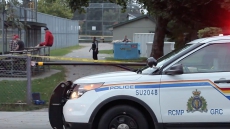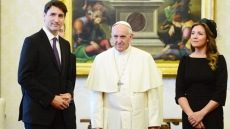NEW YORK — Canada's high-level United Nations charm offensive is back underway in New York City, where Justin Trudeau held court Tuesday at a panel discussion with members of the Council on Foreign Relations.
The prime minister, Foreign Affairs Minister Chrystia Freeland and Trade Diversification Minister Jim Carr fielded questions on everything from Canada's protracted NAFTA talks, to Venezuela's escalating human rights crisis, to U.S. President Donald Trump.
But shortly after their appearance, and not far away, Trump and his trade czar put on an offensive of their own.
U.S. Trade Representative Robert Lighthizer, speaking at another event in New York, took aim at Canada's bargaining positions in the two countries' effort to negotiate a new North American Free Trade Agreement.
Lighthizer said Canadian negotiators have refused to make concessions in essential areas for the Americans. This, he added, has put a "fair amount of distance" between the two sides.
The Trump administration has been pushing for a final text of an agreement with Canada by this weekend to meet a congressional deadline to review any new deal.
The U.S. and Mexico announced a bilateral trade agreement last month and the White House wants an updated three-country deal signed by Enrique Pena Nieto, Mexico's outgoing president, before he leaves office on Dec. 1.
Lighthizer reiterated Tuesday that the U.S. is willing to sign two one-on-one trade pacts instead of a three-party deal, if necessary.
"We're going to go ahead with Mexico. If Canada comes along now, that would be the best. If Canada comes along later, then that's what will happen," he said at an annual summit hosted by an American non-profit organization.
Trump vowed Tuesday, during his address to the UN General Assembly, that his administration would systematically renegotiate "broken and bad trade deals." He warned countries of the world that "the United States will not be taken advantage of any longer."
"Those days are over," said Trump, who didn't specifically mention Canada in his speech.
"We will no longer tolerate such abuse. We will not allow our workers to be victimized, our companies to be cheated, and our wealth to be plundered and transferred. America will never apologize for protecting its citizens."
The speech underpinned Trump's "America First" policy, which, as he put it, rejects "the ideology of globalism" and puts "the doctrine of patriotism" at the core of its decisions.
Trump's remarks stood in contrast to Trudeau's comments earlier in the day.
During the panel discussion, the prime minister said a central question in the current political discourse is whether leaders should be helping to ease and address that uncertainty — or exploiting it for short-term political gain.
Economic uncertainty is one of the driving forces behind the nationalist sentiments at work in the U.S. and parts of Europe.
Freeland told the forum that the question of job retraining in the 21st century — and the uncertainty that surrounds it — is the federal government's central preoccupation.
And she said that while no one has any easy answers, the federal government is committed to working together with Canadians to find new solutions.




